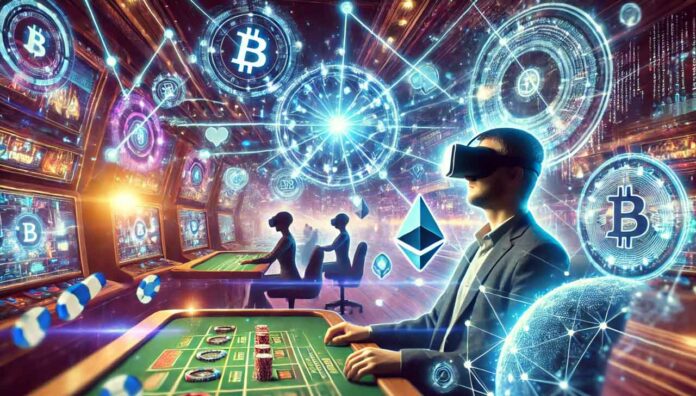Introduction
The evolution of gaming is being driven by two key innovations: VR and blockchain technology. Together, these technologies are revolutionizing the way we experience games, offering new levels of immersion, security, and player ownership.
The Immersive Power of VR in Gaming
Virtual Reality has rapidly become a cornerstone of modern gaming, offering experiences that were once only imaginable in science fiction. Unlike traditional gaming setups where players interact with a screen, VR places them inside the game itself. The sensation of being physically present in a digital environment is what makes VR so compelling. Whether it’s exploring alien worlds, participating in high-stakes heists, or simply socializing in virtual spaces, VR changes the way we perceive and interact with games.
One of the biggest advantages of VR is its ability to make gaming more immersive and engaging. The technology provides a 360-degree experience where players can look around, move, and interact with the environment in real-time. This level of interaction is something that traditional gaming platforms simply cannot offer. Moreover, VR enhances the emotional impact of games, making victories more satisfying and challenges more intense.
Blockchain’s Role in Gaming: Beyond Currency
While VR focuses on immersion, blockchain technology addresses some of the most significant issues in gaming, such as security, transparency, and ownership. Blockchain allows for the creation of decentralized gaming ecosystems where players have true ownership over their in-game assets. These assets, whether they are virtual land, rare items, or characters, can be bought, sold, or traded securely without the risk of fraud.
Another critical advantage of blockchain in gaming is its ability to ensure fair play. With blockchain, all transactions and in-game actions are recorded on an immutable ledger. This means that players can trust that the game is fair and that their achievements are legitimate. The transparency that blockchain offers is particularly important in competitive gaming environments where fairness is crucial.
Decentralized Gaming Economies
Blockchain also enables the creation of decentralized gaming economies, where players can earn cryptocurrency by playing and contributing to the game. These economies are not controlled by a single entity but are driven by the players themselves. For instance, in some blockchain-based games, players can create content, such as weapons or levels, and sell them to other players. This not only gives players more control over their gaming experience but also allows them to profit from their creativity.
The Convergence of VR, Blockchain, and Live Gaming
One of the most exciting developments in the gaming industry is the integration of VR and blockchain with live gaming experiences. Imagine stepping into a virtual environment where you can interact with other players in real-time, engage in competitive games, and even participate in live events. This integration is particularly transformative in genres that thrive on interaction and real-time decision-making.
For example, live gaming has become increasingly popular in online platforms, where games like roulette, blackjack, and poker are brought to life with real dealers and players from around the world. The combination of VR and blockchain in this space enhances the authenticity and security of the experience. In a VR environment, players can walk through a virtual casino, choose their tables, and interact with dealers as if they were there in person. Meanwhile, blockchain ensures that every bet is fair, and every transaction is secure.
Subtle applications of this convergence are already being seen in online entertainment, where you can play live games in online casino settings with a level of immersion that was previously impossible. The fusion of these technologies promises to elevate the live gaming experience, making it more engaging and trustworthy.
Future Prospects: Where Are We Heading?
As VR and blockchain technologies continue to evolve, we can expect even more innovative applications in gaming. Developers are exploring new ways to integrate these technologies, creating games that are not only immersive but also secure and player-driven. The future may see more games where players can move seamlessly between different platforms, retaining ownership of their assets and identities across different virtual worlds.
Moreover, the rise of decentralized platforms could lead to new forms of gaming experiences that we haven’t even imagined yet. These platforms might allow players to build entire virtual economies, govern themselves within the game, and create content that influences the game world in significant ways.
Conclusion
The intersection of VR, gaming, and blockchain technology is paving the way for a new era of digital entertainment. These innovations are not only enhancing the gaming experience but also reshaping the industry itself. As we move forward, the combination of immersive VR environments, secure blockchain systems, and live interactive experiences will define the future of gaming, offering players a more engaging, trustworthy, and player-centric experience.







